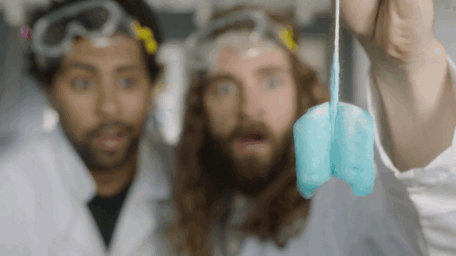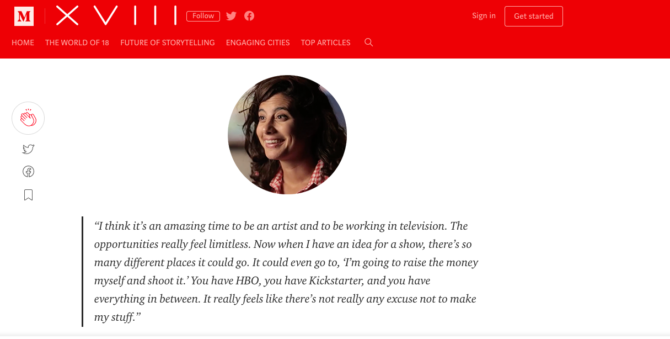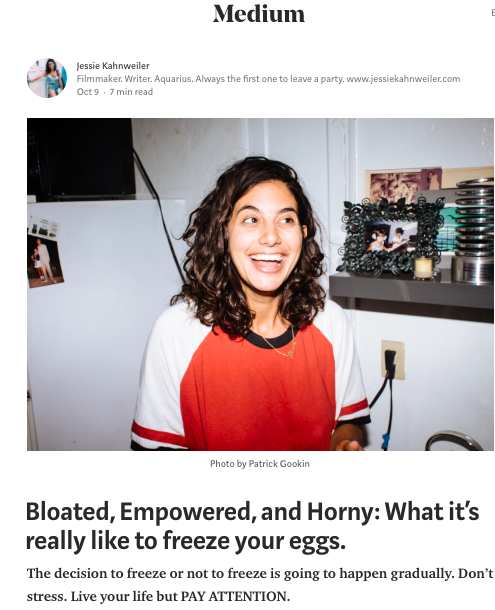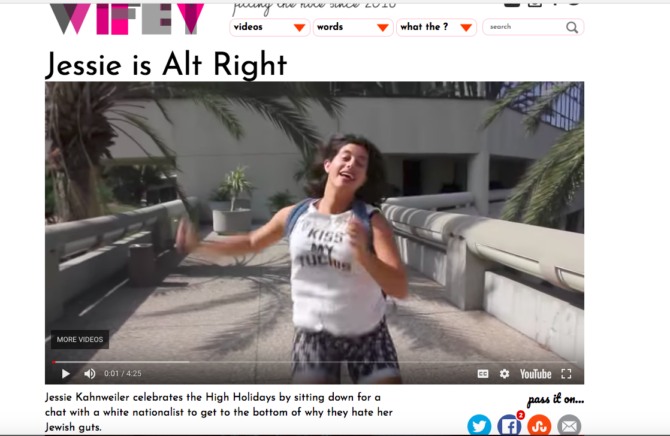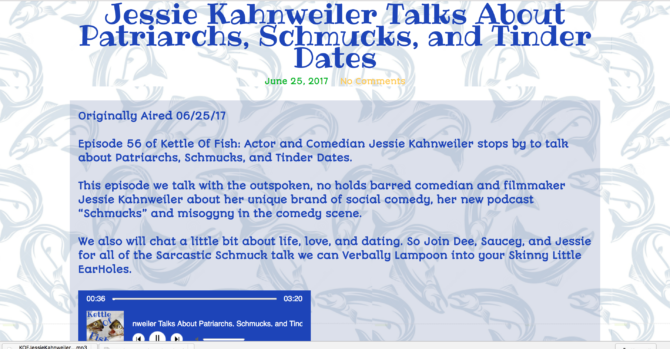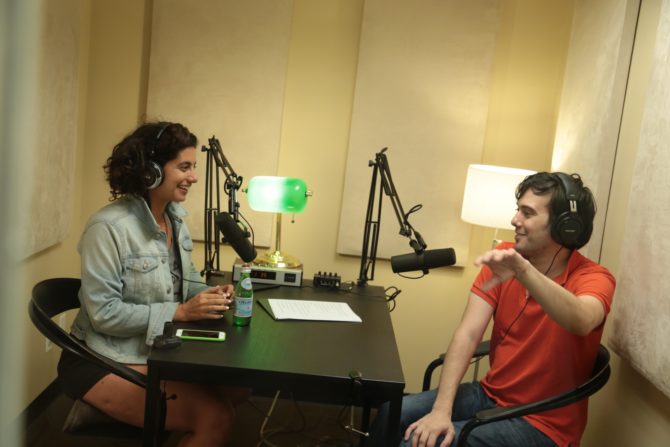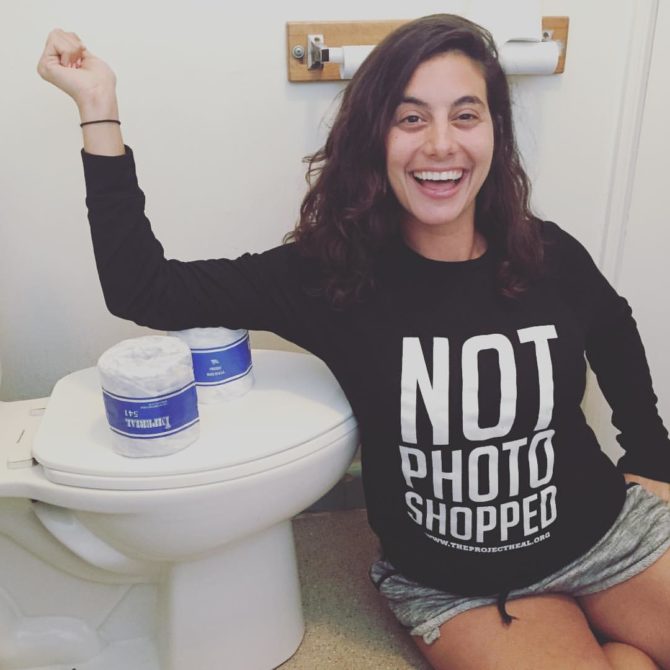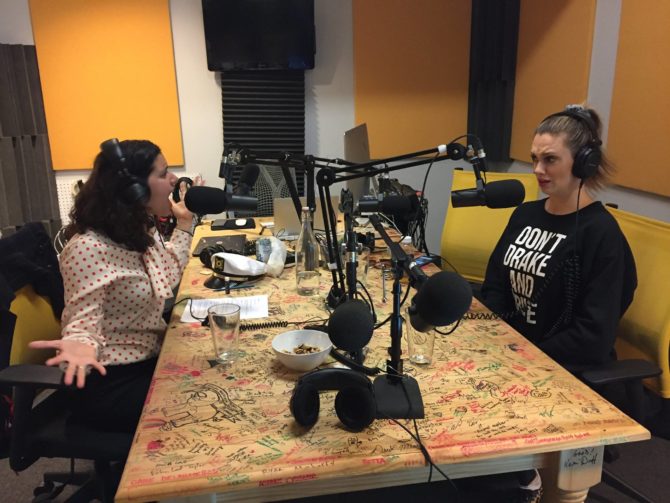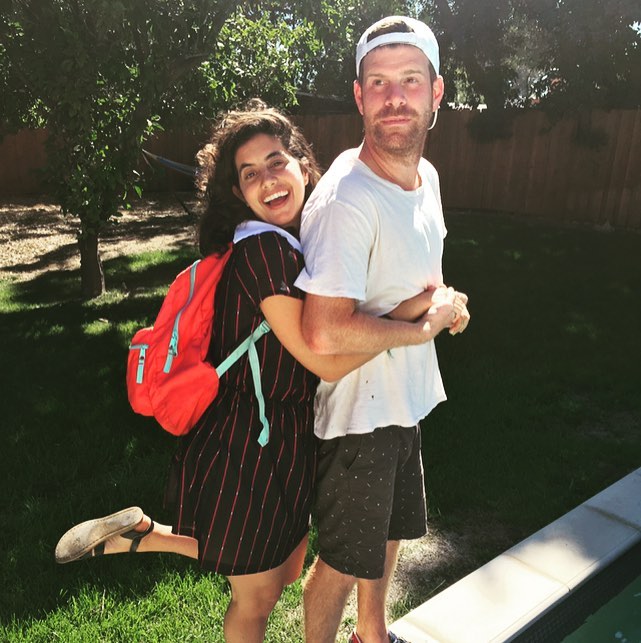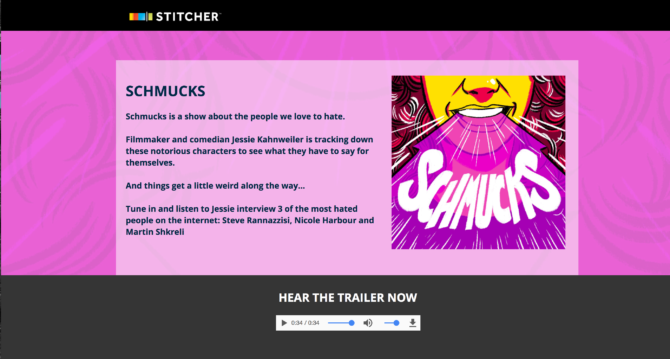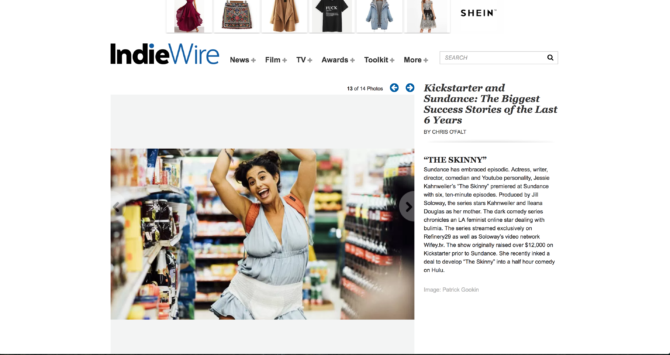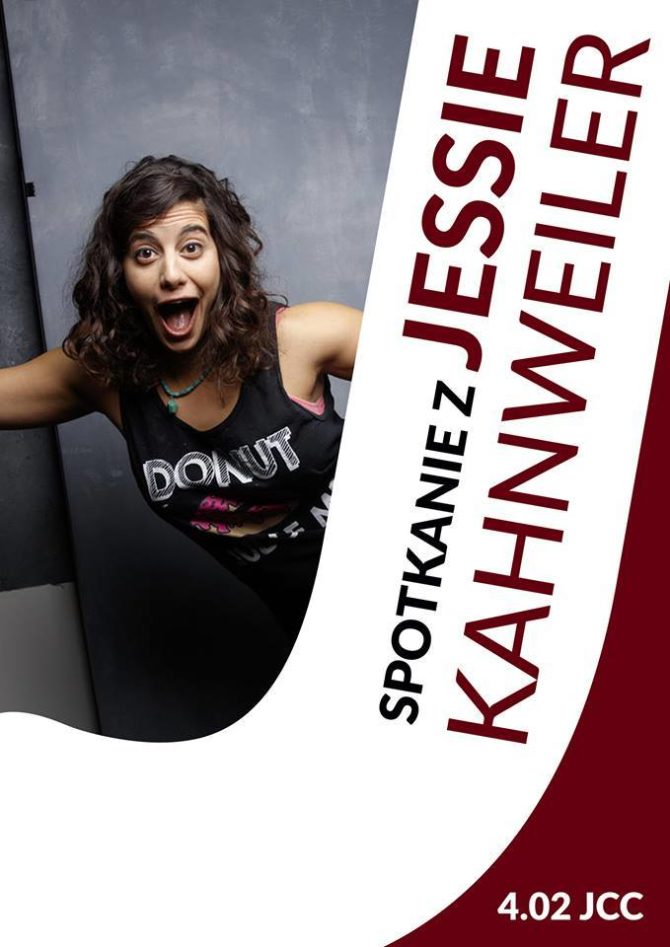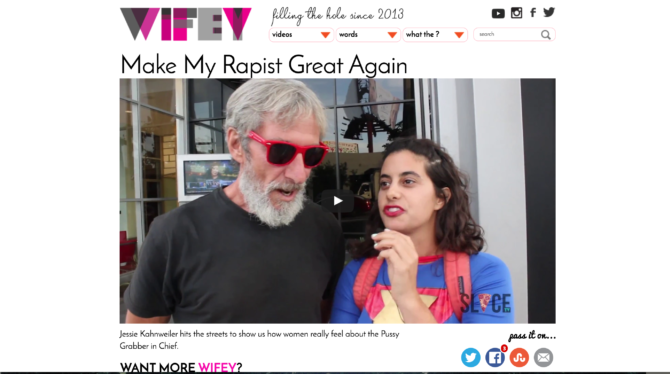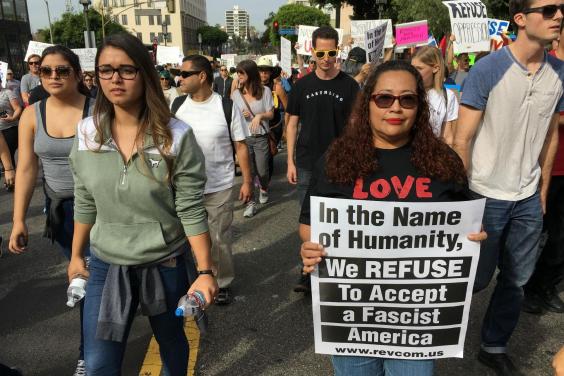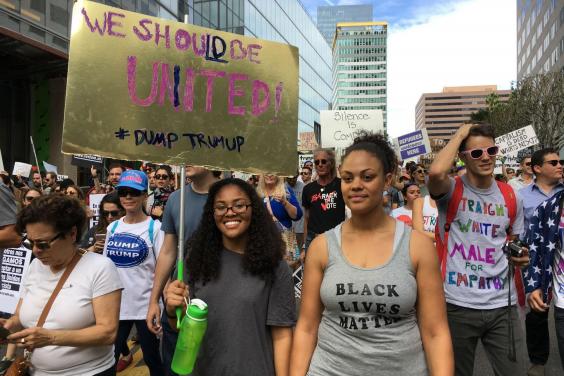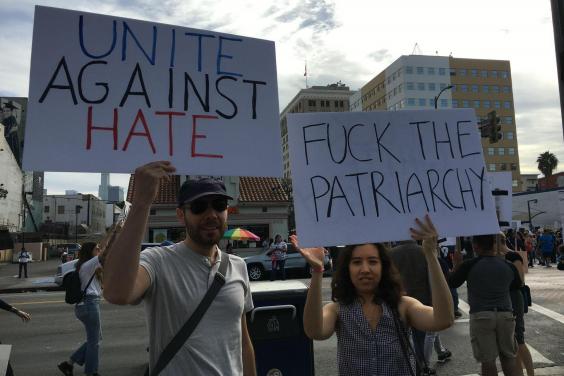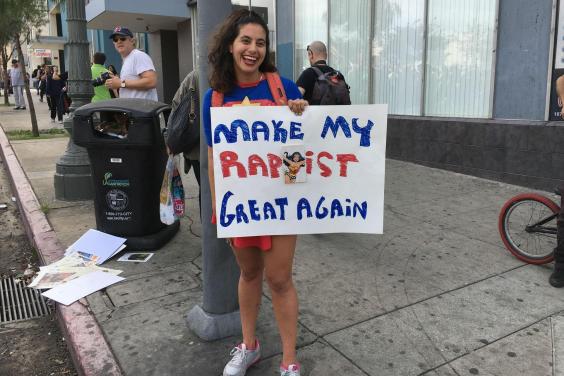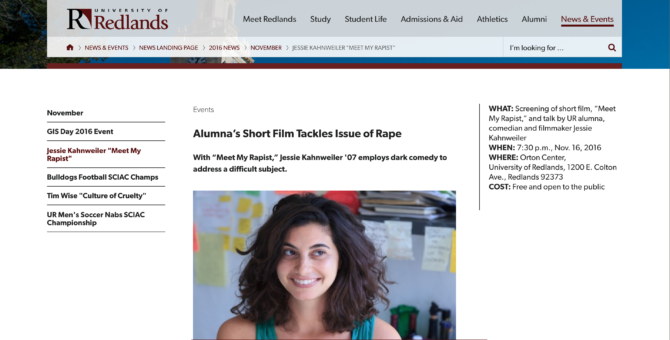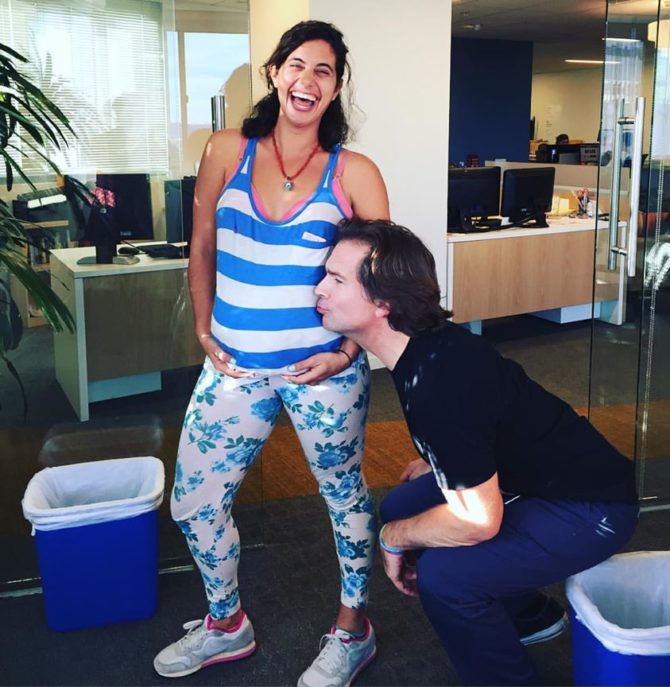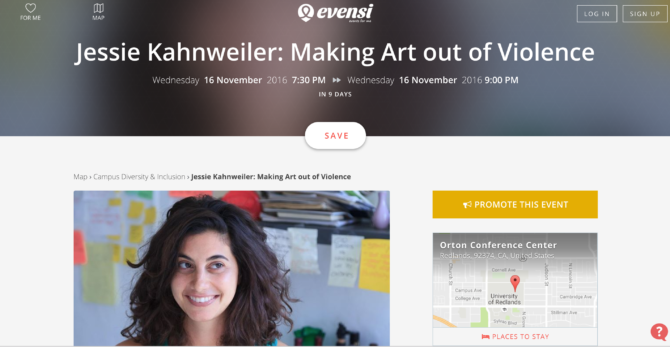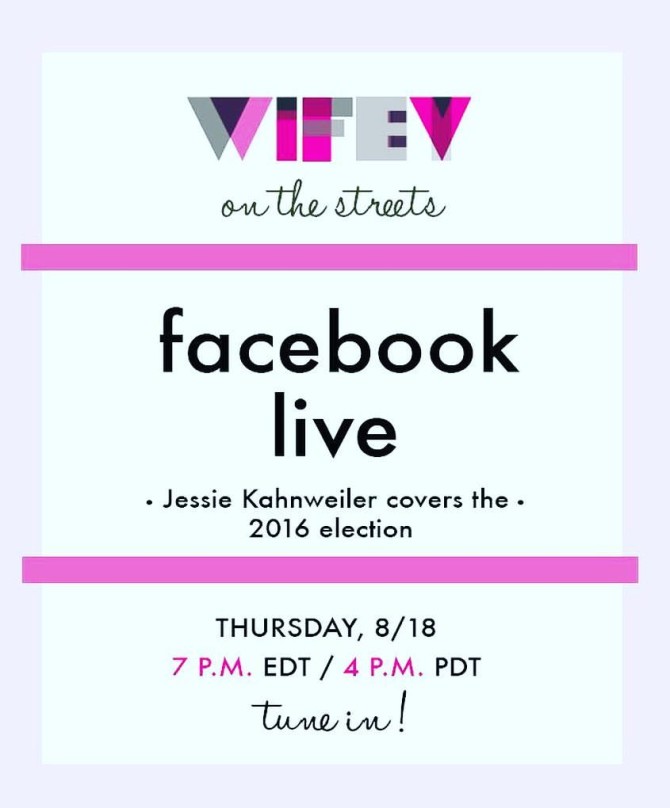test
THE FORWARD
WATCH: ‘West Wing’ and ‘Mean Girls’ Stars Join With Hillel To Get Out The Jewish Vote
When a Jew turns 12 or 13, according to tradition, she has a bat mitzvah.
When a Jew turns 18, according to a new video from Hillel, she has a MitzVote.
In the niftiest thing to come out of Hillel since the matzo sandwich, the Jewish campus organization paired with celebs to make a non-partisan video urging 18-20 year old Jews to vote in the upcoming midterm election. Lisa Edelstein (of “House” and “The West Wing”) and Josh Malina (of “The West Wing” and “The Big Bang Theory”) star in the video, a cheeky send-up of b’nei mitzvah party videos made by loved ones, as parents of a brand new 18-year-old who’ll celebrate her “MitzVote” in November.
Alongside a chilled out female rabbi and an enthusiastic URJ summer camp counselor, the video features cameos by beloved HQ Trivia host Scott Rogowsky and “Mean Girls” and “The Goldbergs” star Tim Meadows. But the best line comes from the fictional “MitzVote” celebrant’s grandparents:
Grandpa: Your great-grandfather didn’t vote in the 1933 elections. Grandma: In Germany! Grandpa: Big mistake.
So vote! Or curse your descendants with intergenerational guilt forever. According to the Hillel MitzVote site, only 15% of 18-20 year olds voted in the 2014 midterm elections. So if you’re a Jewish American and you’re eligible to vote for the first time, see you out there. And happy MitzVote.
Jenny Singer is the deputy lifestyle editor for the Forward. You can reach her at Singer@forward.com or on Twitter @jeanvaljenny
JTA
Joshua Malina and Lisa Edelstein star in Hillel’s get-out-the-vote campaign video
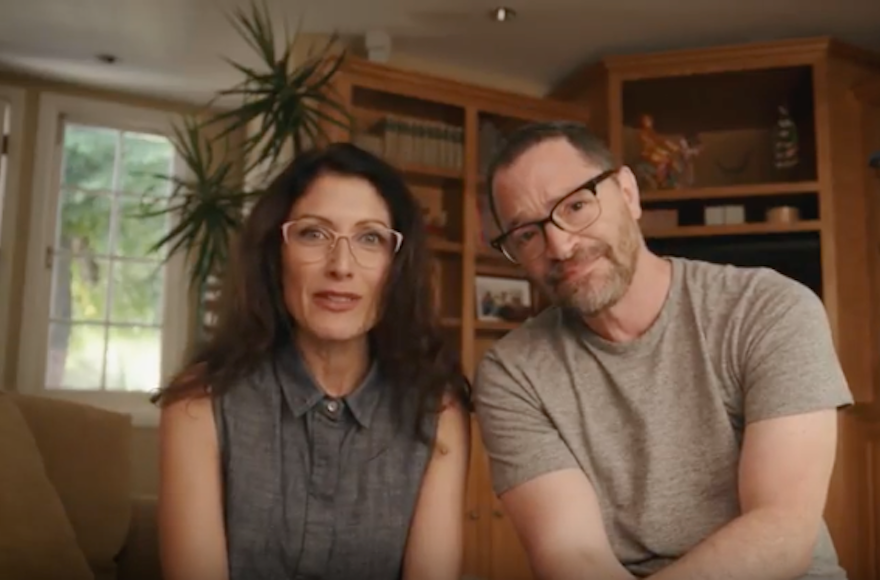
Lisa Edelstein and Joshua Malina star in the launch video for Hillel International’s “MitzVote” campaign. (Screenshot via YouTube)
(JTA) — Joshua Malina and Lisa Edelstein are among the actors and comedians starring in a campaign launched by Hillel International to encourage college students to vote.
Malina, known for his role on the TV series “The West Wing,” and Edelstein, of “House,” portray parents congratulating their daughter on turning 18 and becoming a “MitzVote,” a play on the Jewish bar and bat mitzvah coming-of-age ceremony.
The comic video also features Israeli-American actress Odeya Rush, comedian Michael Ian Black, “Saturday Night Live” alumnus Tim Meadows and Scott Rogowsky, who hosts the popular smartphone game show HQTrivia.
The actors portray relatives of the teen, from Rush as a reluctant sister to Black and Meadows as family friends who refer to her as “the second favorite” child, who congratulate her on being able to vote in short clips.
The video, released Thursday, marks the launch of Hillel International’s MitzVote campaign, which aims to register and engage 100,000 young voters on over 100 college campuses across the United States.
The non-partisan campaign aims to give “college students an opportunity to become engaged citizens in the way that b’nai mitzvot recognizes young Jews as an adult in the Jewish community,” according to a statement.
“Long before American democracy was born, Jews have been celebrating their b’nai mitzvot. This campaign is creating a meaningful coming-of-age experience for all Americans who turn 18 and are eligible to vote,” said Sheila Katz, vice president for student engagement and leadership at Hillel International.
The organization is partnering with Hillel chapters across the country, get-out-the-vote groups and Jewish fraternities and organizations as part of the campaign. The video was produced by Mik Moore, one of the creators of “The Great Schlep,” a Jewish initiative that promoted Barack Obama’s presidential run in 2008.
Katz told JTA that the fact that Moore’s past work did not affect the non-partisan nature of the campaign.
“We’re not endorsing any candidates, we’re not pushing out a particular agenda, other than voting is a Jewish value, and we were excited to hire a great creative agency that has a history of doing political campaigns and other types of campaigns,” she said.
Watch the video here:
MITZVOTE
Did jew know only 15% of 18-20 year-olds voted in the 2014 midterms? For the upcoming 2018 midterms there are over 20 million new eligible voters! Check out this video I directed for Hillel to help raise awareness and get young people registered and voting in the most important midterms EVER! Please share on your millennial’s timelines if they haven’t blocked you from FB. See YOU at the polls. Register and learn more about the Mitzvote campaign HERE
MADAME NOIRE
Would You Let A Man Go Down On You While You’re On Your Period?

Getty
One woman’s Tampax parody commercial has caused quite the discussion online. In it, she shows two men convincing a young woman to let her boyfriend go down on her while she’s on her period.
Don’t believe me, just watch.
In response to the inevitable conversation her commercial started, Jessie Kahnweiler said she made the commercial in response to her own trepidation about having oral sex on her period. In an interview with Refinery 29, Kahnweiler said she was trying to combat the “wow I feel gross” feelings that many women experience during their periods, feelings that often prevent them from engaging in sexual activity.
In fact, Kahnweiler said that in one of her previous relationships, a man shamed her simply for having a vagina. Whether she was bleeding or not, he would make her wash it before they had sex. (No word about whether or not he had to wash before.) As you can imagine, it created a lot of shame around her body. Later, she had a partner who was willing to go down on her while she was on her period.
At first, Kahnweiler said she was like, “no way” but he explained that since she was going to be using a tampon, he wouldn’t have to interact with any blood. She described it as a Eureka moment. “I was like, ‘Oh my God, what have I been doing the past 32 years of my life not getting head on my period? That’s crazy.”
I’m sure most of us had the same reaction. Nah that’s a bit much. Still, the more I think about it the more I realize that all of the reasons not to do it, have a lot to do with our own conceptions and perceptions about our body. Even with the thought of menstrual blood being removed from the equation, I’m sure some of us thought about potential smell and whether our partner would be okay with that. Some of us are concerned about being perceived as unclean. Really, the issue isn’t whether or not we’d actually want to have sex. Many women can tell you after the hellacious first/second day of her period, with hormones raging, sex sounds like a great idea. But if we’re being honest, we don’t really like or appreciate our vaginas when we’re on our period— or generally—so the thought that someone else might seems odd, foreign, gross even.
Refinery29
 When I was 22, I dated a guy who asked me to shower before he would touch my pussy. So I did what women do best: blamed myself, hopped in the tub, and scrubbed away. But along with my scent, I also loofahed away my dignity. I felt so ashamed of my vagina that I began to see my body as the main problem in our relationship. Then, when I got my period, he wouldn’t even be in the same room with it! I found this so frustrating especially because when I’m on my period I get horny AF. I soon came to my senses, stopped dating douchebags, and began to repair my strained relationship to with my own vagina. I talked with other women and quickly discovered I was not the only one who has internalized their partner’s vaginal hangups and sincerely believed their pussy was to blame.
When I was 22, I dated a guy who asked me to shower before he would touch my pussy. So I did what women do best: blamed myself, hopped in the tub, and scrubbed away. But along with my scent, I also loofahed away my dignity. I felt so ashamed of my vagina that I began to see my body as the main problem in our relationship. Then, when I got my period, he wouldn’t even be in the same room with it! I found this so frustrating especially because when I’m on my period I get horny AF. I soon came to my senses, stopped dating douchebags, and began to repair my strained relationship to with my own vagina. I talked with other women and quickly discovered I was not the only one who has internalized their partner’s vaginal hangups and sincerely believed their pussy was to blame.
I decided to partner with Alpen and shoot this spec commercial as a love letter to vagina’s everywhere. I want to celebrate female pleasure and menstruation in all its beautiful mess. To me, the hottest thing is being able to show your entire self to your partner, to truly be seen. Creating this commercial reminded me that there is nothing sexier than love.
JEWESS
Jessie Kahnweiler is a comedy writer and executive producer of the upcoming CW series “The Viagra Diaries.” In 2013, she created a web series about finding her Jewish identity called, “Dude, Where’s My Chutzpah?,” in which she traveled to Israel, visited a mikvah in Pico-Robertson, Los Angeles, and spoke with a rabbi about spiritual matters.
Kahnweiler also created the Refinery29 web series “The Skinny,” which was about having an eating disorder, and the short film “Meet My Rapist,” about a chance encounter with her rapist at a farmer’s market. In October of 2017, she wrote an essay on Medium about her decision to freeze her eggs, which was then reported on in People magazine.
Sundance you crazy bitch I love you. Thank you for teaching me to trust my crazy, to always bring a change of underwear, and that the real party is doing the actual work. Also if you’re in park city this week don’t miss @shoshannah7 @itsjoshfeldman brilliant series #thisclose and @iamreigreen #monstersandmenfilm ![]() 🎬
🎬![]() 💯
💯![]() 🎉
🎉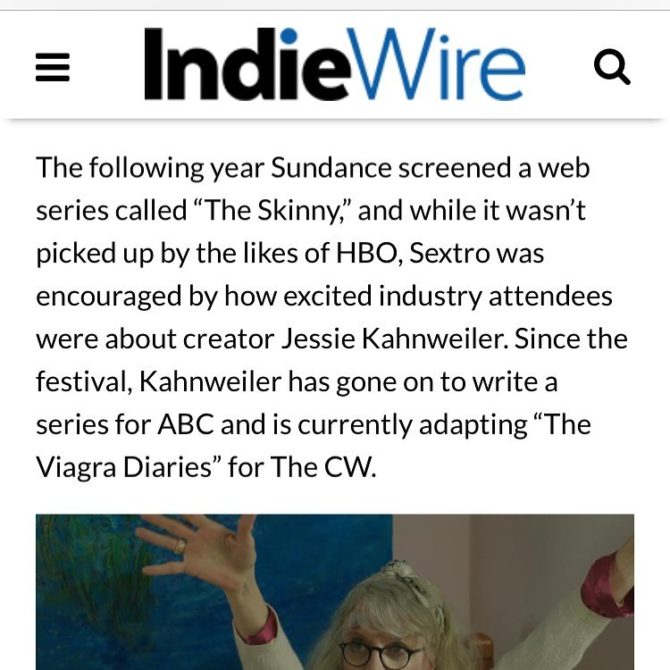
‘The Viagra Diaries’: Jessie Kahnweiler Tapped As Writer For the CW Series

Jessie Kahnweiler (Meet My Rapist, The Skinny) has signed on to pen the series adaptation and executive produce The Viagra Diaries for the CW.

Based on the critically praised and irreverent book by Barbara Rose Booker, The Viagra Diaries centers on Kit, a gorgeous intern new in town who gets the break of a lifetime when she poses as the online avatar for her literary hero, Anny, a 40 year-old journalist fighting to stay relevant. Anny must keep her true identity hidden just as her writing finds a new world-wide audience and Kit gets all the credit.
Kahnweiler also exec produces with Erwin More and Brian Medavoy (American High, Just Shoot Me). Alan Nevins and Suzy Unger are also on board to produce.

Kahnweiler first became known for writing, directing and starring in her short film, Meet My Rapist, a comedic exploration of Kahnweiler’s own experience with sexual assault, which debuted at the 2014 Slamdance Film Festival. She then wrote, directed and starred in a comedic short form series called The Skinny that explored a young woman’s struggles with bulimia, which was also rooted in her own struggles. The series, produced by Jill Soloway and Paul Young, was one of the first short form series ever to premiere at the 2016 Sundance Film Festival. Kahnweiler also developed Bump, a show about surrogacy which sold to ABC digital.
Kahnweiler is repped by ICM Partners and managed by Paul Young.
PEOPLE MAGAZINE
What It’s Like to Freeze Your Eggs at 32: ‘I Didn’t Want to Be at War with My Own Biology’

Jessie Kahnweiler, a 32-year-old Los Angeles-based filmmaker, has never shied away from taking on sensitive and controversial topics, and her latest project is no exception: freezing her eggs.
In a recent essay, she openly discusses everything from the pressure she felt of having to “find the one” and the experiences that led to her decision to go through with the procedure.
“The decision to freeze or not to freeze is going to happen gradually,” she wrote. “Don’t stress. Live your life but pay attention.”
Putting Herself First
The idea of freezing her eggs first came to Kahnweiler’s mind when a guy she was casually seeing told her that he didn’t want to ever have kids.
Kahnweiler quickly responded, “Whatever. I don’t need kids. My films are my babies.”
But the honest truth, she says, is that she really does want a partner and a family one day.
“There is this social stigma that as women we don’t want to be baby crazy and we don’t want to scare off guys,” she says. “But I do want a family and I’m just now realizing that. I didn’t want to be in the position where I was at war with my own biology. There was something that I could do, so why not do it.”
“It’s way too much pressure to put on someone that you’re dating and on myself,” she adds.
A few months after their conversation, they broke up, and Kahnweiler began to work on Bump — a potential TV series about a twenty-something woman who becomes a surrogate for an interfile 40-year-old woman.
“For the project, I interviewed dozens of women in their forties who experienced fertility issues. Some chose adoption, some chose multiple rounds of IVF, some chose to stop trying to have kids entirely — but all of them said the same thing to me: “I wish I could have been more proactive when I was younger,” she wrote.
“Meaning, by freezing their eggs they could have possibly avoided some of the emotional and financial stress that fertility treatment entails. Even though it is widely known egg freezing is not a ‘foolproof’ plan it does give you more options in the long run. For my career, I have taken every action, hustlin’ 24/7. Why not do the same thing for my own body?”
These eye opening experiences led her to “decide to bust out the bottle service and put my eggs on ice,” she wrote. “Or at least go talk to a doctor about it…”
A Crash Course on Fertility
The night before Kahnweiler had her first consultation with a fertility specialist, she stayed up late on the Internet to come up with a list of prepared questions.
“Will the procedure damage my ovaries? No. Will it decrease my chance of having kids naturally? No. Will the hormones drive me to the brink of insanity? No,” she wrote.
She also realized that her well-educated friends also had zero education on what it really meant to freeze your eggs.
“There is still so much stigma,” she says. “Some of them said, ‘Wait, wont that kill your ovaries?’ There is so much fear. People need to start talking about it more.”
While the decision to freeze her eggs was difficult, she didn’t know how tough the hormones she was required to take would also be on her body.
“I had to give myself all of these [hormone] shots and mix all of these chemicals,” she says, “and I had to do it at a certain time every day. It was painful. Emotionally, you’re on this total roller coaster — and you’re bloated.”
Kahnweiler says she ate crackers and drank ginger ale for almost two weeks before her procedure because she was too nauseous to eat.
“I took the shots every night before I went to bed so I could sleep through most of the symptoms,” she says.
When Kahnweiler’s doctor determined that her eggs were ready to be retrieved, they give her a shot that she had to take in the middle of the night to induce ovulation.
After her actual egg retrieval in July, she says she felt sore and tired, but she was physically back to her old self in less than two weeks.
“Emotionally, I was depleted and sad, but this can be really normal because of the hormones and the experience itself,” she says. “But I felt so incredibly happy that I’d done it and was so grateful for my body.”
The experience also made her realize how lucky she was to even have the procedure.
“Freezing your eggs is a financial burden. It’s over $10,000. There are payment plans, but I personally would not have been able to freeze my eggs without help from my parents. I recognize the extreme position of privilege I am in. I feel grateful. I also feel totally ashamed,” she wrote in the essay. “How can I waste my parents hard-earned money? The world is so overpopulated, does it really need my offspring? How can I be so selfish?”
After a mild freakout, she says she realized that this decision “is not simple or without flaws,” but ultimately, “I want the choice to carry my own child.”
The Road Ahead
Since her procedure over the summer, Kahnweiler says she has been able to live her life with even more freedom than she had before.
“I can continue to pursue my career and not have this pressure to have children now,” she says. “Why do so many men have children later in life? I basically feel like I’m borrowing male privilege. If I want to have a kid at 45, I can have a greater chance of doing that now.”
She is looking forward to working on her movies, becoming more financial stable and eventually bringing a baby into the world when she wants to, not when her biological clock tells her she has to.
And she says it was her 97-year-old grandmother’s reaction to her procedure that really hit home: “She said, ‘Great. Now you won’t have to marry a guy just because you want to have kids.’ ”
Kahnweiler says it was the best decision she ever made.
“Maybe I’ll defrost the eggs in 10 years, maybe I’ll adopt, maybe I’ll be the quirky stepmom, or maybe I’ll just get more cats,” she wrote. “The point is, I am now an educated woman with choices.”
My Grandpa’s nickname finally caught on.

READ HERE
KETTLE OF FISH INTERVIEW
fun talking #shmuckspodcast, Cosby, and Cuba all b4 brushing my teeth. Listen HERE
Excited to be part of the Transforming Hollywood event at UCLA on Friday. Will probably shave (the front of) my legs but can’t make any promises.
Tix avail HERE
THE OBSERVER
‘Schmucks’: A Podcast That Brings Us Another Side of the Internet’s Most Hated People

Jessie Kahnweiler and Martin Shkrelli. courtesy Jessie Kahnweiler
From her hit YouTube series “Meet My Rapist” to her recent web series The Skinny, Jesse Kahnweiler has long been one of the most fascinating YouTube personalities. Her ultra-confessional style of interviewing people, along with her glib glee in saying and doing the most ridiculous things in order to uncover deep dark societal truths is entirely unique.
Needless to say, when I found out she was doing a podcast, I was excited.
Her new series “Schmucks” is a three episode mini-series on Earwolf Premium where Jessie talks to the people that the internet loves to hate and tries to understand what makes them do the things they do.
The first episode is about Steve Rannazzisi, star of the television show The League and the fallout that occurred when it was revealed that he wasn’t really at 9/11 when it happened like he said he was. Spoiler: He’s really really sorry.
LA WEEKLY
On Schmucks, a Comedian Interviews People You Hate (Even Martin Shkreli)
“I was like, ‘Fuck, Terry Gross would never do this,’” Kahnweiler says, referencing the host of the NPR show Fresh Air. “I felt like, ‘What have I done? I’m an asshole, I’m a pussy, I’m a coward.’”
But Kahnweiler isn’t a coward — nor does she claim to be a journalist — and so she decided to embrace her on-air flubs, rather than editing them out of the podcast or attempting to re-tape the interview. Acknowledging her own failure to hold Shkreli accountable, she recorded a postscript in which she consults a family member (“He was playing the victim,” her grandmother agrees); gets chewed out by her producer (“You were so friendly and funny and chummy with him that I felt like it was letting him off,” he chides her); and analyzes exactly what went wrong (“I don’t think I was fully honest about how scared I am of him and what he represents, and what I do when I’m scared is I make sex jokes,” Kahnweiler admits). They’re the type of introspective, behind-the-scenes revelations that don’t often make the final cut of a podcast. They’re also part of what makes Schmucks, a new Stitcher Premium series about the most hated people in America, so thrilling to listen to.
“I went into this interview and I felt prepared, I felt very connected to him. I felt like I just showed up and did it,” Kahnweiler says. “It wasn’t until afterward that I got these feelings of dread.” Those feelings of dread later multiplied into sensations of shock and then self-loathing. When Kahnweiler posted to Instagram a photo of her and Shkreli embracing prom date–style, it was met with enraged comments about his marking up the price of an HIV drug. She realized that maybe it was she, not Shkreli, who was the biggest schmuck of all.
“Oh my God, I let everybody down. It was this thing of like, ‘How do I live with myself?’” Kahnweiler remembers thinking. “Not to be melodramatic, but it felt like my whole self-worth was kind of on the chopping block.”
To her credit, there are plenty of redeeming moments throughout the interview with Shkreli, who was recently kicked off Twitter for harassment and is currently on trial facing federal charges of securities fraud. Kahnweiler gets him to open up about his childhood with racist and emotionally abusive parents, his heartbreak over a repeatedly failed relationship and his poor hygiene habits, including that he hates brushing his teeth with a passion typically only seen in preschoolers. The point of the podcast, she says, isn’t to convince listeners that Shkreli is a supervillain — he does a pretty good job of that on his own — but to examine the person beneath the headlines, many of which declare him the most hated man in America.
“Just try sitting in a room with somebody. It’s such a different experience than being on Twitter and having your opinions,” she says. “You’re forced to be in the humanity of the moment.”
Kahnweiler is no stranger to being on the receiving end of internet hate. As a filmmaker and performer who frequently uses the medium to explore her own sexuality, body image and eating disorder, she’s gotten rape and death threats from male commenters across Reddit, YouTube and Instagram. “It’s one thing to be like, ‘Oh, this person called me fat.’ But it’s another to be like, ‘Oh, this person wants to rape and kill me,’” she says. “I’m very fascinated by the emotional and psychological effects of living your life out loud online — because obviously I have a personal vested interest in it because I love the internet, but also, the internet can suck a dick.”

|
Kahnweiler with Nicole Arbour
Courtesy Jessie Kahnweiler
|
Nicole Arbour, another interview subject featured on Schmucks, likely can relate. The former professional cheerleader turned YouTube personality achieved viral Internet fame in 2015 after her video “Dear Fat People” — which might be described as the opposite of a love letter — garnered a tidal wave of backlash from celebrities who accused her of bullying and fat-shaming. Steve Rannazzisi, the other guest Kahnweiler tapped for the three-part podcast series, is a television actor who became a pariah after admitting he lied about having escaped from the World Trade Center on 9/11.
“There’s the concern with the podcast that we’re just giving a platform for hate, and that’s something that I was really nervous about,” Kahnweiler says. “But it’s like, well, I’m not going to not do the podcast, and that’s a risk — I’m going to try as hard as I can to make this thoughtful.”
Kahnweiler has gotten heat for sympathizing with guests like Shkreli, whom she allowed to downplay serious accusations. But she says the social experiment at the center of the podcast could serve as a powerful lesson in a country that’s divided by political extremes. “I look at all these people now who voted for Donald Trump,” she says. “What am I going to do: Am I going to hate these people, or try to understand them? I think that’s the next level is trying to understand them.”
Are there other dream guests she’d like to book on the podcast someday? “I wrote to Charles Manson,” she says. “So, fingers crossed.”
Season finale of Shmucks
For the season finale of SHMUCKS I sit down with the most hated man on the internet, MARTIN SHKRELI. Listen for free on itunes —> HERE
National Eating Disorders Awareness Week
Check out Ep. 2 of SHMUCKS ft. Nicole Arbour who discusses her viral video DEAR FAT PEOPLE, body image and being hated online. In the words of my father “She seems like a very interesting woman” Father knows best so check it out!
*in order to listen to shmucks you have to sign up for Sticher premium here http://www.stitcherpremium.com/schmucks and then download the APP to listen on your phone. It’s a pain in the ass but so am i so…
LISTEN TO SHMUCKS NOW!
The first episode of SHMUCKS features comedian, actor, and pool owner @steverannazzisi Steve got supes deep about his experience getting caught in a lie and dealing with Internet shaming. What lies have I told in an effort to find my identity? Does the truth really set you free? What the hell is a first down anyway? Listen by signing up for #sticherradio and use promo code SHMUCKS for a free month trial. http://www.stitcherpremium.com/schmucks #sticherradio #shmuckspodcast #vulnerability
Honored to make this list. @kickstarter is the longer relationship I’ve ever been in and we’re just getting started baby 
JCC POLAND!
We invite you to a meeting with Jessie Kahnweiler, a filmmaker from Los Angeles who comes to Warsaw to take part in Asylum Arts project at the POLIN Museum. The show includes storytelling, screening the episodes, and a talkback with audience – the show runs a little over an hour. Afterwards, a less formal part with kosher snacks and wine. Feel welcome!
The meeting will be held in English.
The event is coorganised by Hillel Warsaw (Hillel Warszawa) RSVP HERE
VEDEM (which means to lead) was an underground newspaper written by jewish boys while prisoners in the Terezin ghetto. “The writers braved hunger, exhaustition, and forced labor. They would regurlarly risk their lives by sneaking into forbidden places in the ghetto in order to write”
This photo is of Petr Ginz who was just 14 when he created the magazine. Ginz proclaimed “you probably think you know Terezin well. I want to prove you wrong” Please join us for the open reception of the VEDEM exhibition tomorrow night at 730 at the silverlake jcc and our panel discussion “creative activism: From Terezin to Trump” @sijcc and yes @ivankatrump you’re invited of course but only if you bring the kugel
STOP THE SILENCE
Interviews
Jessie Kahnweiler
Jessie Kahnweiler is a filmmaker based in Los Angeles, California. She’s pretty amazing. I reached out to Jessie after watching her web series, The Skinny, which closely touches on her own experiences with bulimia, and she agreed to do an interview! The Skinny is absolutely fantastic, and available on YouTube, so you should check it out!
K: Hey, Jessie! Thank you so much for talking to us!
J: No problem!
K: Ok, so here’s my first question: do you think there is a significant and separate stigma against just eating disorders in the world of mental health?
J: Yeah, definitely! I don’t even think I initially knew eating disorders were a mental illness, because it deals with food, and the representation of eating disorders in the media is so one-sided, like a thin ballerina trying to lose weight. It’s very focused on the physical aspect of it. I think it gave me the message that it was just a silly thing, and that I just needed to get my weight under control and then I’d be fine. I never considered it a mental illness, or even anything of the mind, and to me, that’s pretty much why eating disorders are so shameful. They’re not given the regard that other mental illnesses are given – and even other addictions! I guess people just assume that it’s food and you should just be able to handle it. So that’s part of the reason why I was in denial for so long, because I didn’t know eating disorders were a problem.
K: Yeah, I definitely think that’s a huge problem, and part of the reason why eating disorders are so detrimental. Part of the reason I loved The Skinny so much was that it felt like the first real, raw representation of eating disorders that I had seen in the media. I feel like eating disorders are often romanticized, and the media only seems to represent a very small percentage of the community. The way that eating disorders are represented in the media doesn’t even show relapse. I think that’s part of the reason why The Skinny is so powerful – it shows the full recovery process in an honest and genuine way. How did it feel to make something where you were really throwing yourself out there, especially with how The Skinny explored the underrepresented parts of having an eating disorder?
J: Well, it was really fucking terrifying, and I didn’t want to do it at first. But I saw those Lifetime movies too, and my friends and I would talk about them – and honestly, they did a better job of giving you tips on how to have an eating disorder than representing the issue at hand in an authentic way. That was part of the reason I wanted to make The Skinny. For me, the process was about how I could take this really personal thing and make it relatable for a wider audience. Life is all about trying to matter, trying to figure it out in the world, and trying to cope when you don’t have any resources. What do you do when you’re lonely and scared? What do you do when your heart is broken? Everyone experiences these things, but I used bulimia as coping mechanism. Of course, that caused so many more problems. That’s kind of the irony of eating disorders – you use them to escape your problems, and you wind up with even more problems. That’s what I really wanted to show – to heal and to start a larger conversation about eating disorders in general. I also didn’t want to make light of eating disorders in any way, but at least in my experience with recovery, there is so much humor in everything, and I get through my experiences in life by laughing at them, and that’s what I did with The Skinny.
K: Oh, yeah! The Skinny had perfect levity. It was so funny without making light of eating disorders in any way.
J: Thank you!
K: I also read another interview… I think it was with Refinery29, and you were talking about the importance of being honest, which I think is so important, especially with eating disorders. To you, what is the importance of being honest with yourself about your eating disorder beyond The Skinny?
J: Well, yeah, it’s kind of everything, right? How do I show up and live my life honestly? – That’s what being in recovery means to me. It’s a day-to-day thing. I also say that I will have an eating disorder forever, and I don’t mean this in a hopeless way. I say it in a way that keeps me honest. There are things I need to do everyday, to stay focused on recovery. There are big things, like finding healthier people to date, and there are little things, like getting enough sleep. It really affects every aspect of my life. For my art, right now I’m working on like seven projects at the same time, and I still have to figure out how to take care of myself. With The Skinny, this was what I really wanted to face. And the crazy thing is, once you stop vomiting, it’s like, “Well, what was I vomiting over? What was making me vomit?” And it was literally life. It was my inability to cope with life! For me, I’m also not going to get over it in a day, or by making a web series, but it’s also like, “Oh, this is the beginning of a much longer journey,” and that journey is life. I don’t think it ever stops, and I don’t think it’s ever like, “You have arrived.” That’s such counterintuitive thinking for my eating disorder, which has always said “Once you’re thin, you’ll be perfect and happy,” and that is such an illusion. Recovery is like trying to live in reality. Even with The Skinny, it felt really good for people to tell me that they loved the show, but I also was like, “Ok, this isn’t going to fix me.”
K: What does being in recovery mean to you, and how do you maintain or support your recovery?
J: Well, there are a number of things I do to support my recovery. I go to a support group, and I’m friends with lots of other girls that have had experiences with eating disorders who I speak with on an almost daily basis. I think it’s all about finding community, because it’s so hard. It’s really impossible to do on your own. Now I recognize how horrible my mindset was! I literally thought I could handle it on my own, and there was just no way I could have done that.
K: Yeah! Eating disorders can also be so isolating, so I definitely agree that finding a supportive community is so important.
J: Totally! And for me, I think it really forced me to get honest and find friends that got me for me.
K: Definitely. Going off on that – when you were in a more severe stage of your eating disorder, did you find that your relationships with others were affected seriously?
J: Oh, yeah, it affected every relationship. I mean I have ADD now –
K: Oh, I have ADHD, so pretty much the same thing!
J: I have no attention span, I’m always distracted, always thinking of a million things, and I think it all got really affected because I was so deep in self-hatred and was always obsessing my body, so I wasn’t really present a lot. It’s not a black and white thing – I still had a lot of amazing relationships, and had a ton of great people in my life, but I wasn’t fully present for a lot of it. That’s something I still work on. So many people think eating disorders are all about you and hurting yourself, but you’re really also hurting others, because you’re not able to be fully present or honest. Bulimia is like a full time job – you’re lying about food, you’re lying about where you’re getting food, you’re lying about where you’re going, and it just creates these heart-breaking barriers with people you love.
K: Yeah, that’s such a big part of it too – being mindful and in the moment is so important for me. Since I have ADHD, everything always feels like it’s moving so, so quickly, so it’s easy to act impulsively and such until I can really slow things down.
J: Dude, I fucking hear that. I think everyone struggles with that to some degree!
K: Yeah, definitely! It’s so hard to be present when there are so many other things going on at the same time.
J: Absolutely!
K: Ok, here’s a question: what are the three things you truly want people to understand about having an eating disorder?
J: I guess it would be that it’s not about weight, it is in the mind, and the eating disorder can really be so incredibly powerful. I think when my parents and other people found out, they all felt really helpless. And it’s really heart-breaking – I get this question a lot, “What am I supposed to do?” So many times, it’s just offering support and empathy. What has really helped me the most is when people are like, “God, I get it.” or “I don’t get it personally, but I empathize.” That is the opposite of secrets, shame, and lying. Offer people the space to feel! And I guess in a dream scenario, think. Especially before you comment on someone’s body. You need to think and be sensitive because you have no idea what people are going through. We tend to laugh at eating disorders, but they’re really serious. It’s life or death. It’s a slow death, and it’s a mental death.
K: Absolutely! One last question: how has filmmaking been an outlet for you?
J: It’s been like my life! It’s everything to me – my creative outlet has saved my life. I don’t know what I’d do without it. I call it learning in public, because I’m just trying to go on my journey, and figure out what the fuck it means to be me! So yeah, it’s literally everything to me.
K: Amazing! Thank you so much for taking the time to talk with us! You are incredible, and I can’t wait to see what comes next for you!
J: Yeah, thank you!
THE INDEPENDENT
Anti-Trump protesters fill streets across the US in fifth day of demonstrations against the President-elect
Donald Trump will be able to wield power with more freedom than almost any president in modern times, but he also faces an unparalleled wave of public opposition

BUMP!
So excited to announce our big news! We are pregnant with another web series! BUMP is a family friendly comedy about fertility, shame, and boundaries. Stoked to work with @abcd Let’s go baby! #BUMPTv #abc #webseries — with Paul Young at Disney-ABC.
University of Redlands
I’ll be at my Alma Mater next week! It’s going to get really REAL so there will be a counselor present but I’ll be talking her ear off. Get Tickets HERE
YAY LA
JESSIE KAHNWEILER TALKS HER RAW, FUNNY THE SKINNY

Writer/director Jessie Kahnweiler discusses her painfully funny webseries The Skinny, now available via Refinery29.
by Daniel Barron
The pratfalls of making it and faking it as a Millennial have become well-tread ground in film, TV, and especially DIY online content. We persevere in the face of questionable internships, a noncommittal dating landscape, a fickle job market, and the pursuit of abstract concepts like “influencers” and “going viral.” Self-reflexive, yes, but often still in good fun. That snake finally chokes on its tail with writer/director Jessie Kahnweiler’s honest, acidic webseries The Skinny, which premiered in January on Refinery29 from Executive Producer Jill Soloway (creator of Transparent). The six-episode show follows Kahnweiler, playing herself, as she attempts to preserve her dignity and sobriety while chasing success as a YouTube star. The comedic actress has previously drawn praise in The New York Times, The Guardian, and Cosmopolitan for her provocative, often hilarious, videos that gave a royal roasting to rape culture and white privilege. She is no more charitable when examining her own issues, including bulimia and toxic co-dependency. If most mumblecore is Billy Madison, The Skinny is Punch-Drunk Love. The series also co-stars Illeana Douglas as her mother and premiered at this past Sundance Film Festival. It went on to receive a Webby award for Best Dramatic Series.
The concept of capturing what is “real” or “authentic” in entertainment is better stated than achieved, and usually is an ideal that exists to be varnished and homogenized. These notions clash with Kahnweiler, who has little interest in safe material, and The Skinny resists classification. Kahnweiler may be widely recognized as a comedic actress, but her creation defies the impulse to be a non-stop joke machine. “I certainly thought a lot about tone,” she says, “but I also think it’s really counter-productive to say, ‘This is going to be a comedy.’ It makes more sense to work from the inside out. What is the story you want to tell?”
This ethos is perhaps best exemplified in a scene that occurs early in episode 3, where Kahnweiler is pitching her material to a roomful of potential financiers. She shows them a clip in which she shows her support for veterans by crudely offering them sex. “Real women are the next wave of clickbait!” enthuses her producer. “No one likes women that real,” someone deflects.
“I think [that scene] was a reaction to being a female trying to create content in a very specific way while trying super hard to make men and women like me. You want me to be funnier, you want me to be louder, you want me to be real, but you also want me to be sexy-real. It’s exhausting. Who do I need to be? That’s a question we ask in the show.”
So how has the actual public reacted? “There are people who really don’t like it and that’s actually a huge compliment. I want everyone to love it- slash me- but they don’t and I think that’s what art is supposed to do. It’s supposed to polarize people [laughs]. Any kind of reaction is a win.”
Sometimes that means winning big, especially from young women who connect with the material on a deep personal level. Kahnweiler has spent the past year touring The Skinny on college campuses and having an open, often humbling, conversation with students. “It’s special because it’s so much bigger than me. There’s so much shame that no one wants to talk about. What does it mean to be a feminist? What does it mean to hate myself and not know what to do about it? For me observing other people allowing themselves to be so vulnerable is the greatest gift.”
As with her onscreen counterpart, coming to terms with her own limitations is part of the growing process. “I’ve also learned that I can’t be responsible for fixing people.”
Since self-help is rarely an easy process, the The Skinny leaves no tidy conclusion for its protagonist, who tiptoes towards recovery. Details are tight on a second season, but Kahnweiler states that there have been discussions. She is, however, very pleased with her results. “Making [The Skinny] was a great exercise in getting out of my own way and making something really personal.”
Admirers of Kahnweiler’s work get can dirty again much sooner when her podcast Safe Space debuts on the Earwolf network this coming January. The show revolves around Kahnweiler getting personal with some of society’s most infamous public figures, such as comedian Steve Rannazzisi and pharmaceutical entrepreneur Martin Shkreli.
Oy vey.
Random Lengths
Kahnweiler Finds the Humor in Heartache
Published on October 17th, 2016 | by Adriana Catanzarite
By Adriana Catanzarite, Contributing Reporter
Jessie Kahnweiler has some serious chutzpah. Or, as the goyim might call it: guts.
It’s hard to find any other description for a woman who demonstrates the existence of white privilege by trying to get arrested—walking up to two cops, offering to sell them her antidepressants and walking away undetained. On another occasion, Kahnweiler crossed the Green Line in Israel simply to ask border guards if they were circumcised.
The Los Angeles-based 30-year-old writes, directs and acts in Web shorts and series. She has been making a name for herself the past few years with her special brand of comedy.
In 2013, she created a webseries on YouTube called Dude, Where’s My Chutzpah?, where she tries to discover her Jewish identity through a series of hilarious trials and errors. Her short video, Meet My Rapist, went viral that same year. The film is about a fictionalized Kahnweiler running into her rapist at a farmer’s market. Kahnweiler explained that it was a response to her own feelings after she was raped 10 years ago while studying abroad in Vietnam. While the subject matter may seem somber, the end result is a genuinely touching and surprisingly funny look at something that far-too many women have to cope with.
Paul Young, the co-founder of Principato-Young Entertainment, said that this was what drew him to start working with Kahnweiler as her manager.
“I initially became aware of Jessie because I saw her short film, Meet My Rapist,” Young said. “It was such a courageous, funny and meaningful short film that represented a rare talent in Jessie.”
A native of Atlanta, Georgia, the first documentary Kahnweiler created and directed was Little America, which she made during her senior year at the University of Redlands. Kahnweiler and a friend hitchhiked across the country with truck drivers, interviewing the various people they met at truck stops. Kahnweiler admits that this was reckless, but she relished the opportunity to meet new people, especially those that society has cast off or ignored. She found it to be a spiritual experience, and said that was when she found her purpose. The comedy came later.
“I never really set out specifically to do comedy,” Kahnweiler said. “I started making documentaries, so I was always behind the camera. Everything that I worked on always felt very personal, but it wasn’t until I started really taking on the issues of pain in my own life that I really developed my style.”
When Kahnweiler went through a particularly bad breakup, she decided to write a comedy about it. The experience helped her process her pain, but ultimately she found that it resonated it with other people, who shared their breakup stories with her.
“I come from a family [that] always laughs at the hardest things,” Kahnweiler said. “That’s how we cope with this stuff. So just being able to laugh about it, it felt very natural.”
Since then, Kahnweiler’s projects have only gotten funnier, not to mention, more personal. Her newest web series, The Skinny, delves into the life of a young woman navigating her increasing Internet fame, while also dealing with bulimia. Kahnweiler struggled with her own bulimia for 10 years, using some of her own experiences as fodder for the show’s comedy. The series, produced by Refinery29 and Jill Solloway’s Wifey.tv, debuted at Sundance earlier this year. It also won a Webby—the Oscars for online content—for best dramatic series. That award doesn’t quite do The Skinny justice; the series is more than just a drama. It’s not just “that show about bulimia.”
Throughout the six 10-minute episodes, the main character Jessie, played by Kahnweiler, navigates her turbulent personal life when her ex, Cole, a recovering junkie, moves in with her mom, played by the fabulous Illeana Douglas.
There are a myriad of entertaining moments, like when Jessie rips into the media executives who say she’s just another pair of tits.
“I am so sick of asking men with man buns and tuna breath for permission to be myself!” she yells. “There is more pussy fear in this room than the Republican National Convention!”
Yes, she does eat cake out of the trash, stuff prosciutto, sushi and God knows what else into her bra and she steals a box of chocolate laxatives while wearing a diaper. But the series shows that bulimia is not the cause of Jessie’s problems, it’s her very misguided attempt at bringing some sort of control to the chaos converging around her. It doesn’t overtake her life, but it’s always there in the background waiting for things to go wrong.
Kahnweiler said she was trying to subvert expectations of what someone with an eating disorder looks like. A person doesn’t have to be uber thin to suffer from an eating disorder. It can happen to anyone, even someone as boisterous and outgoing as Jessie.
Kahnweiler maintains that talking about her problems openly has been the best medicine. But when she tried to get The Skinny produced, she found that not a lot of people were willing to go down that path with her, saying it wasn’t “sexy.”
Her manager, Paul Young, and her mentor, Jill Solloway, the creator of Transparent, encouraged her to keep moving pushing forward.
“They said it was too risky it wasn’t commercial enough,” Young said. “I happen to believe that when you tell the truth like that in stories, audiences feel it and want to watch it. It’s that simple. When a storyteller is being authentic, that’s when they tell stories that are emotionally resonant.… She’s just able to go there. She wants to tell the most honest story she can and she’s willing to go through the pain that requires.”
Kahnweiler and Young are working on several different projects, including a new Web- series about a surrogate mother, and trying turn The Skinny into a traditional half-hour long program for television. One thing’s for certain: Kahnweiler is not going to stop delivering her brash style of comedy.
“I really don’t know what I would do without having art to express myself,” Kahnweiler said. “It’s like air.”
THE SKINNY AT USC
The Skinny will be screening at USC Oct 18th at 7pm and our hot ass cast and crew will be in attendance to answer all your questions like who was the biggest diva on set? (no..not me….whatever!) RSVP here for free!
CHUTZPAH EPISODE 1
CHUTZPAH
My Jewy web series CHUTZPAH is dropping on Chosen.tv just in time for apples and honey! COME BURN MY BUSH!
#5777 #happyjewyear
THE PITCH #THESKINNYTV
What’s Underneath??
Excited to be part of this project. Taken off our baggage and bullshit. Feeling ourselves from the inside out.
influence.org

September 6th, 2016
A gallery exhibit of previously unreleased early photos of Amy Winehouse, looking happy and “full of hope,” opens in London on September 13, the day before what would have been the singer’s 33rd birthday.
Celebrations and explorations of her life have continued to emerge since her death five years ago—most notably Amy, the critically acclaimed 2015 documentary. The film portrays the singer’s struggles with drugs and fame; she reportedly used heroin and crack cocaine, and was found by an inquest to have died of alcohol poisoning.
But Amy has been criticized for failing to highlight the role Winehouse’s eating disorder played in her struggles and her eventual death. Her brother, Alex, has said that “what really killed her was the bulimia.”
One such critic is filmmaker Jessie Kahnweiler. She wrote, directed and stars in the web series The Skinny, which tackles bulimia with humor, pathos and rare honesty. Produced by Refinery29 and Jill Soloway‘s Wifey.tv, the six-part dramedy premiered at last year’s Sundance Film Festival, where it was the only web series to land a coveted spot.
Based on Kahnweiler’s own life, the series is about addiction in multiple, intersecting forms, and follows a few days in the life of “Jessie,” a Jewish wannabe YouTube star, as she binges, purges, drinks and uses drugs, has sex, gets dumped, and befriends a younger social media powerhouse and her crew.
The first episode of The Skinny is below, and you can watch the rest here.
Kahnweiler is just getting out of a pool when I call her, giving the impression of a carefree LA life. She comes across as warm, open and funny—a little like “Jessie.” But over the course of the conversation, it became clear that she’s also perceptive and direct.
Including on the topic of the film Amy.
“Amy,” Kahnweiler tells me, “was inspiring.” But she also found it incomplete.
“I felt like they talked about the drug addiction and all that stuff so much,” she says, “but there are scenes of her binging in the documentary that are not talked about [in the film]. This perpetuates the idea that addiction’s just about alcohol and drugs, and you should just be able to get a handle on your ‘weird eating thing.’”
While watching the film, Kahnweiler says she thought “about all the times I did drugs and drank.” For her, “the eating disorder was what they call my ‘core addiction.’ Whenever I did coke or drank it would all be about losing weight or controlling weight, or using alcohol (or men) to replace food.”
It’s unclear whether that was also the case with Winehouse. But Kahnweiler urgently wanted to know things that the movie didn’t address, like, “How did her eating disorder affect her depression?”
She’s not alone in finding the issue under-exposed. “We all knew she was doing it,” Alex Winehouse told the Guardian, “but it’s almost impossible [to tackle], especially if you’re not talking about it. It’s a real dark, dark issue.”
And in a comprehensive essay for Pitchfork, titled “We Need to Talk about Amy Winehouse’s Eating Disorder and Its Role in her Death,” Kayleigh Hughes took a similar position. She described a scene in Amy where “A teenaged Winehouse, snacking with her friends, laments between mouthfuls that she’s a pig and she cannot help herself. In a voiceover during this sequence, the singer’s mother Janis Winehouse recounts the moment a young Amy tells her mother about discovering a great new ‘diet’—eating and then vomiting […Her mother] muses that she essentially ignored the statement and forgot about it, thinking it was a silly teen girl activity that Amy would soon grow out of.”
Hughes wrote that “this casual dismissal—the first mention of Amy Winehouse’s eating disorder—is wrenching, and comes almost halfway into the film. For many viewers, this may be the first they have ever heard about Winehouse’s eating disorder. As well-documented as her struggles with alcohol and drug addiction were, the tiny little fact of her severe, untreated, decade-long eating disorder was rarely mentioned.”
Hughes acknowledged that Winehouse’s official cause of death was alcohol poisoning, but argued that “this can be understood as the equivalent of someone with AIDS who has died of complications from pneumonia. Similar to the way HIV compromises a body’s ability to fight infections, bulimia damages the body to the point where it is no longer able to keep up basic functions and is more susceptible to external threats.”
The Skinny refuses to collude in the kind of cultural dismissal of eating disorders of which Amy stands accused. Neither does it treat bulimia in a narrowly-focused, after-school-special fashion. Instead, over the course of six short episodes, it gets at the interwoven, interactive relationships with drugs, alcohol, food, love, sex, relationships, and technology experienced by one woman.
That’s realistic in that there are clear correlations between problematic relationships with drugs, alcohol and food, according to the National Center on Addiction and Substance Abuse at Columbia University. Statistics vary across studies, but they report that up to 50 percent of people with eating disorders “abuse alcohol or illicit drugs”—far more than the 9 percent figure among the general population. And around 35 percent of alcohol or illicit drug “abusers” have eating disorders, compared with 3 percent of the general population.
Another thing that feels different about The Skinny is its funny yet emotionally resonant approach to bulimia. It’s not a pure dark comedy, with bulimia as a punchline, nor is it purely tragic. I ask Kahnweiler what inspired her.
“There’s a Henry Jaglom movie from 1990 called Eating,” she says. It was made by “this white dude,” but nevertheless, it’s “amazing.”
She describes it as a “‘a day in the life’ about this woman’s dinner party in LA.”
“I remember seeing that,” she says, “and thinking that no one has ever said this stuff out loud about food, and talked so openly about body image. It wasn’t a documentary but it kind of feels like one. That really inspired me when I was still really in my addiction. I was obsessed with it—on a deeper level, it made me feel like I’m not alone, I’m not crazy … it was a really realistic portrayal.”

Though the clothing and decor are cheerfully late-20th century, many of the sentiments in Eating are entirely contemporary.
In one scene, a French ingénue, who attracts the jealousy of the other women for her thin Gallic sexiness, admits that she has made herself throw up after eating. She says that it’s hard for her to admit, because “…you can say I’m an alcoholic or a drug addict, and that’s ok, its kind of interesting. But just saying ‘I have an eating disorder’— it’s so unattractive, it’s so disturbing. I was never able to say that to anyone.”
I ask Kahnweiler if there will be a second season of The Skinny. “I’m developing it right now for TV, as a longer form,” she says, “but still thinking about whether or not I’ll do a second season of the web series. There are different forms it could take, which is really exciting.”
Meanwhile she’s “working on another series which I can’t officially announce yet, but it has to do with motherhood, and infertility and boundaries and shame—it’s gonna be really funny!” We laugh. It makes sense, though. I can see her applying The Skinny‘s tragicomic approach to the topics of infertility and motherhood, which, like bulimia, are hyper-gendered and involve weight, bodies and societal expectations. And in an interesting parallel, Jaglom’s second film in his “women trilogy” after Eating is called Babyfever; you can guess what it’s about. (The third in the series is Going Shopping).
But the new project will be further from Kahweiler’s personal experience.
“I’ve never been pregnant,” she says, “but I’ve definitely felt like I wanted to belong and would do anything to belong. So I’m taking that emotional truth and building a story around that. In some ways it’s awesome writing about your own life, and in some ways it’s harder. [With writing about your own life] you think—’does anyone care about this?’ I tell other writers to go to therapy so you can sort it out first.”
While working on The Skinny, which did deal with issues so close to her own life, she found it helpful to surround herself “with people who can call me on my blind spots. One of my biggest strengths,” she says, “is actually knowing what my weaknesses are.”
I ask her what they are. “Trying to go for the joke,” she answers, “without necessarily having an emotional truth to back that up. Focusing on ‘moments—like when you see a movie and think ‘oh there were good moments in that.’ But I need to work at coming back to ‘what is the story?’”
One aspect of her story that was important to her was showing that in her experience, “when you have an eating disorder it’s not just depression. I had a full life.”
Her goal was “to show the reality of what I went through—which is really sad, and beautiful. But also fun.”
It does look fun, at times. When the “likes” are coming in [when one of “Jessie’s” videos go viral], the blissful expression on her face is similar to the one she has after vomiting or masturbating. When I say that she conveys a lot through that recurring facial expression, she responds that she’s “had a lot of experience!”
And where does technology addiction, if that’s what it is, come in? “The internet is a huge relationship in my own life—getting all the comments—both for good and for bad.”
Kahnweiler says that if she didn’t have a “core base of some kind of spirituality or soul or something deeper,” she “can really get fucked up in that stuff.” She says she’s “very prone to it,” and feels like she has “an addictive personality.”
I wonder whether the new attention she has received for making the show fed into the very addiction it depicts. “There’s been a couple show-within-a-show moments,” she laughs. “When I’m getting all this love, it feels good, like maybe I am queen of the world! Then it goes away and it’s like ‘what is my life?’”
TV is a great medium for her to tell her particular addiction story, she explains, because there’s a lot of space to unfold a saga without a neat ending. “You see so many addiction narratives and the character is better after 90 minutes,” she says. “That is definitely not my story.”
Read more from The Influence:
I Can’t Stop Overeating, But Here’s How I Manage My Struggle
What the Incredible Voyage of This “Godfather” and “Dr. Strangelove” Star Tells Us About Addiction
Follow us on Facebook and Twitter, and sign up to receive daily stories to your inbox.
Instead, the Skinny shows the interactive ebb and flow of relapse and recovery both within and around Jessie. At one point Cole (Jessie’s on-off boyfriend) gets out of rehab and says “My sobriety is the most important thing to me right now.” She responds, “Well you’re the most important thing to me.”
“I’ve had a lot of experience on both ends,” Kahnweiler says. “I’ve been close to many different addicts and also in recovery myself.”
When it’s someone else entering recovery, she says, there’s a fear that they will change. And “they can be kind of annoying, those smug people in recovery—it can be annoying! It is selfish. If you’ve ever been an relationship with an addict, they’re like, ‘I’m sorry I can’t do that—I’m an addict.’ And it’s like, that’s not an excuse to be an asshole!”
But coming at it from the other side, as someone in recovery herself, she says “it’s like, maybe I do need to be selfish right now. And I’m sorry that I can’t be the person that you need me to be in order to feel okay.”
She says that she “doesn’t have the answers, [but] wanted to represent that struggle in the show.”
Kahnweiler has said that “bulimia is something I’m going to have forever.” I ask her why.
“Light question!” she jokes. Then she explains that she’s not currently “actively engaging in bulimia, in terms of binging and purging” (though that period of her life lasted 10 years). But she does “believe it’s an addiction, in that there’s stuff that I need to do every single day to protect myself and keep my health.” Her list includes support groups, therapy, meditation, yoga, making sure she eats three meals a day and doesn’t skip meals, and practicing “self-care, self-love and service to others.”
“I don’t want to get into the habit of thinking I can rest on my laurels,” she says. “The bulimia is a symptom, and the core issue was just feeling terrified of my own mind, not feeling comfortable in my own skin. That was a way to distract and control.”
I ask her if she has any advice for people wondering if they have a problematic relationship with food.
“For so many years,” she says, “I thought that because I’m not super skinny or because I’m not throwing up 50 times a day I’m not sick enough. I had this idea about what it meant to have an eating disorder, and that kept me really silent and ashamed.” Her weight, she says, “hasn’t changed since recovery.” But her mental state has.
“I know it sounds cheesy,” she says, “but there is so much help out there. You can find help anywhere in the internet age—you can find help on instagram. We partnered with the National Eating Disorder Association for The Skinny—they’re a great organization.”
For people suffering yet wondering if they actually need help, Kahnweiler says: “If you think, ‘I’m not sick enough,’ maybe re-frame it as: ‘I deserve to be happy.’”
Same Same Different Podcast
Listen here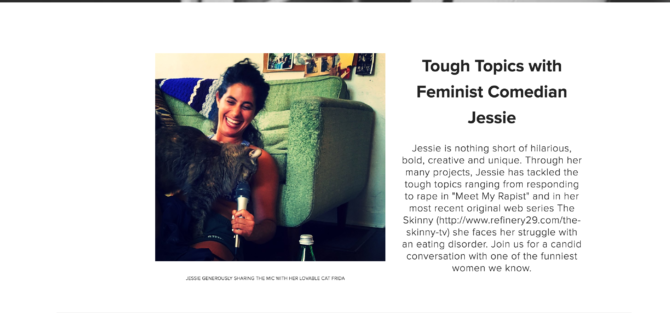
Drama Quarterly
Giving weight to web drama
Web series The Skinny tackles dramatic subjects like eating disorders with heavy dose of comedy. As part of DQ’s Digital Drama Season, filmmaker Jessie Kahnweiler explains why budget remains the only separator between online and TV drama.
Eating disorders might not be the first topic that springs to mind for a new comedy, but it’s the dramatic nature of the subject at the heart of web series The Skinny that makes it stand out from the online crowd.
A 2016 Webby Award winner, The Skinny sees writer/director Jessie Kahnweiler play a fictionalised version of herself as wannabe YouTube star Jessie, who attempts to face up to and overcome bulimia – an illness Kahnweiler herself has struggled with.
“The Skinny is about our desire to avoid discomfort,” Kahnweiler tells DQ from her parents’ home in Atlanta, Georgia. “In season one we’re watching what effect that has on your life. You cause yourself a world of pain to try to avoid discomfort so we’re setting up those seeds and [examining] how those issues become a security blanket. We’re just setting up this rollercoaster ride of insanity and a lot of fun.

“My goal for the first season was to create a character who has a problem but has an amazing life and sex and dreams. We’re all like that. We all have so much stuff that’s horrifying and amazing, we’re not one-dimensional.”
Kahnweiler is no stranger to filmmaking. She has her own YouTube channel filled with videos such as Jessie Gets Arrested and Meet My Rapist.
And for her next project, she wanted to confront her experiences of bulimia by putting a humorous spin on a very personal story.
“Looking back, everything came together really organically, even though at the time it felt like a fucking mess. It felt like a hurricane,” Kahnweiler says of The Skinny’s origins.
After failing to find success in shopping the pilot she had written, the comedian decided to let the camera do the talking and film it herself.
“Whenever I have an idea, people are like, ‘That sounds like the worst idea ever,’” she declares. “My pitches often leave people crying in the room horrified. I did a comedy about sexual assault. So people were like, ‘Bulimic comedy? Absolutely not. That will never work.’”
Kahnweiler grouped together some friends to make a half-hour spec pilot that landed in the hands of Jill Soloway, the creator of Amazon’s award-winning Transparent, who suggested some editing work to get it into shape. The resultant promo, paid for with a successful Kickstarter campaign, was watched by style website Refinery 29, which ended up picking up a six-part series.
“Having Jill was really a turning point for me,” she admits. “Yes, it’s very personal but it’s not a documentary. When I first sat down and started working with her, she was like, ‘This isn’t therapy – this is not ‘hey world look at me’.’ This is creating something that everyone can identify with and that feels emotionally solid. The story really connects and you’re wondering what’s going to happen and you care about these people, so it’s not just this girl is puking. That is the difference between Transparent and a lot of shows – you actually give a shit, and it’s hard to make people give a shit.”
Kahnweiler confesses that the biggest thing she learned from the process is that she needs to be able to talk through stories and plot points when she writes, rather than writing in isolation. Soloway paired her with two associate producers from Transparent who would break down story with her and build episodes in a way that makes viewers want to continue watching after the credits roll.
“For me, it was so important to have people around me that really called me on my shit, because I think sometimes people can be so positive,” she notes. “Sometimes I could get really funny or really crazy, so it was great to have people around me – imagine a bunch of judgemental British people! I would yell and scream because you don’t want to write another draft but The Skinny wouldn’t have been what it is without those conversations. That’s what I learned – writing isn’t about sitting down at the typewriter and just having it all pour out. It’s really wrestling and struggling and it was kind of the moments that came out of those really hard conversations.”
With unrestricted freedom granted by Refinery, which encouraged Kahnweiler to always push the show harder and further, she admits she would impose her own limits to create boundaries for the series to live within. This included keeping a handle on the levels of nudity and swearing, to ensure the show was as accessible as possible to all audiences.
One note from Soloway also instructed her to focus on ‘bubble scenes,’ those “money shots” in each episode that drive the plot and the characters forward.

But how did she manage writing, directing and starring in her own web series? “I love it because I’m a masochistic control freak,” she jokes. “I love it because you’re writing throughout the process. Fifty percent of writing is done in the editing – I don’t think people realise that. It’s amazing how much is done in editing. So I find it, as a writer, really amazing to be able to be there.
“But the most helpful thing I found was locking those scripts. It might not be perfect, or you might not know if it’s going to work, but just being able to give yourself the grace of locking the script so then you can go on set and you’re not worried about rewriting. You can work those kinks out on set but I wouldn’t have been able to make it with directing and writing if I was still rewriting on set.”
However, the nature of the subject at hand meant Kahnweiler had to be frank and confess to her producers that this isn’t a story that could be neatly wrapped up at the end of its first season.
“The biggest challenge we had was convincing the producers and Refinery [that Jessie is] not going to get better in the first season. These kinds of things, you don’t wrap them up in six neat little episodes. It’s a long road.”
Though traditional television networks didn’t pick up her ideas first time around, Kahnweiler is now once again shopping The Skinny to broadcasters. But whether a linear channel or another online outlet picks up season two, the writer is in no doubt that web series and TV are crossing over and the boundaries are becoming increasingly blurry.
“Netflix has web series now and pretty soon you’ll turn on Netflix and there will be a 30-second episode,” she explains. “I think time is this revolutionary thing – it’s whatever the content, whatever the episodes want to be. There’s still a separation, mostly by budget, but there are all the opportunities in the world and there are no excuses not to be making your own content. I’m very grateful to be on this path.
“All these projects I’m working on, a couple of years ago people would have been like, ‘Absolutely fucking not, no way’ – and people still are, but you have to keep proving yourself. These are the stories I want to tell and only I can tell. The coolest thing about The Skinny is that the Kickstarter was funded by all these women with eating disorders. It’s amazing because it brings the conversation closer. Everyone’s talking to each other. You want to watch real shit? You want to make real shit? OK, let’s get to work!”
Focusing on the story for season two, “whether that’s on HBO or tampons.com, I don’t really care but it’s going to be out there for sure,” she adds. “I have a feature I’m working on and I’m working on two web series about fertility and women’s issues. I’m just taking all this collective trauma – sexual abuse, eating disorders, infertility – it’s a party!”
tagged in: Jessie Kahnweiler, Jill Soloway, Refinery 29, The Skinny, YouTube

